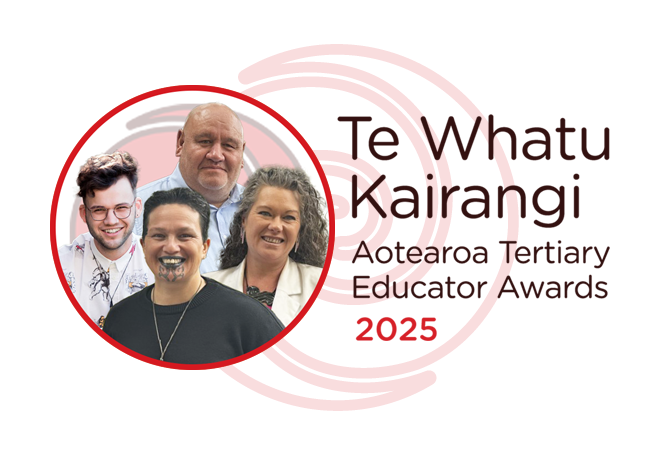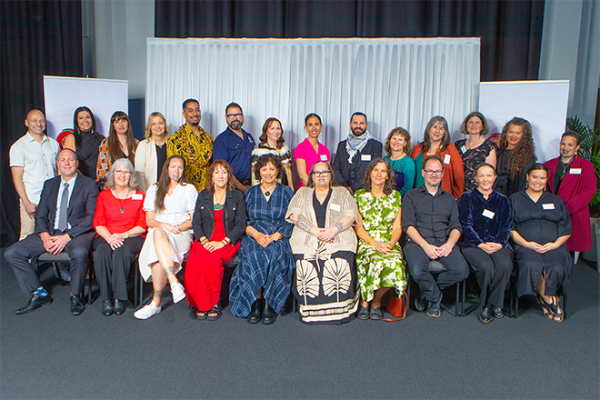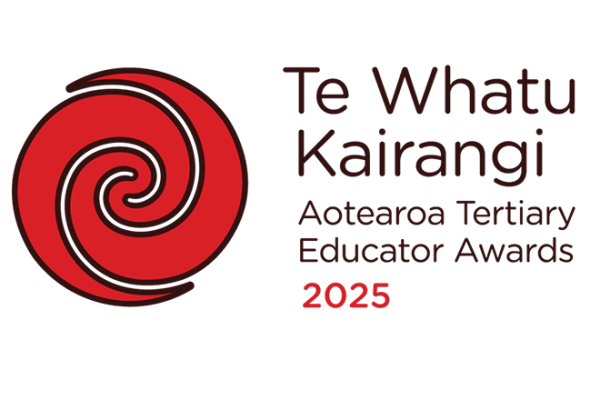Master of Māori and Indigenous Leadership Programme
No one can create change alone… he toa takitini
Group Category winner: Kaupapa Māori
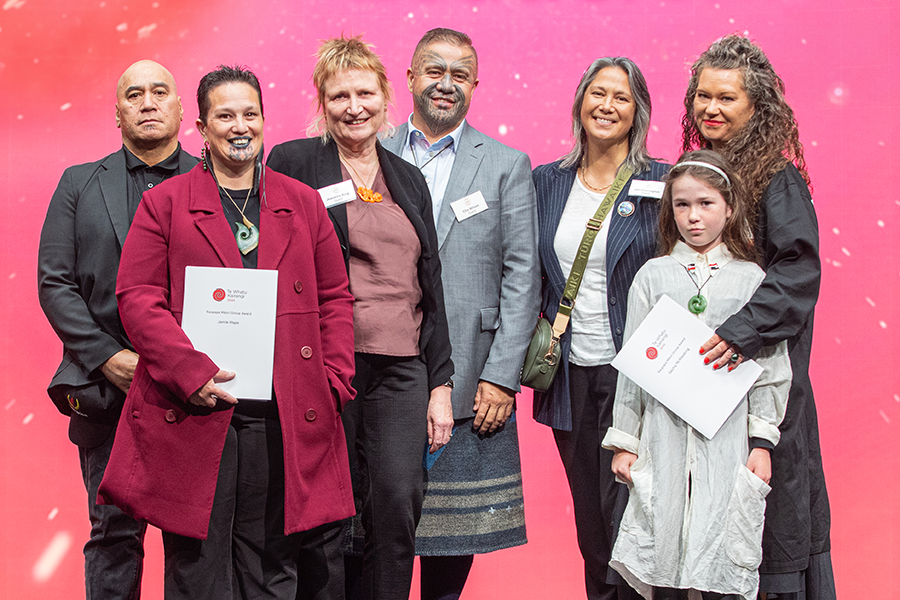
Master of Māori and Indigenous Leadership (MMIL) Team– Aotahi School of Māori and Indigenous Studies, University of Canterbury | Te Whare Wānanga o Waitaha
- Associate Professor Garrick Cooper
- Associate Professor Sacha McMeeking
- Jamie Hape
- Liam Grant.
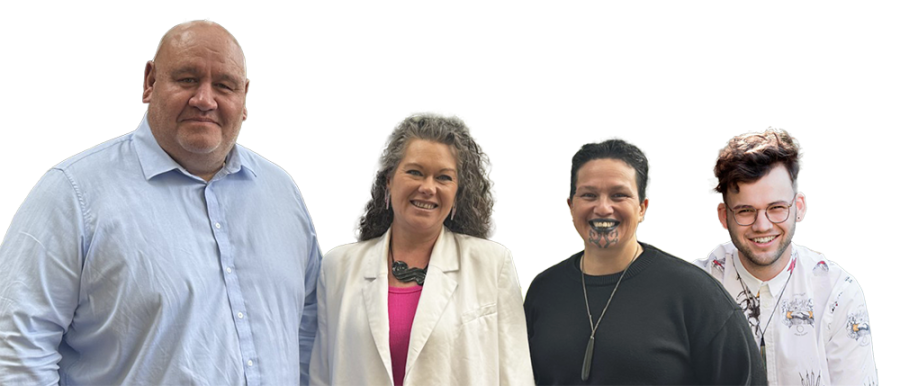
Left to right: Associate Professor Garrick Cooper, Associate Professor Sacha McMeeking, Jamie Hape and Liam Grant
“Our goal was to keep ākonga connected and on their whenua to ensure they could continue to work, support their communities, and have an impact whilst learning.”
The University of Canterbury’s Master of Māori and Indigenous Leadership (MMIL) programme was sparked by a conversation between Sacha McMeeking (then Head of Aotahi: School of Māori and Indigenous Studies) and Ta Tipene O’Regan, who reflected that the networks he developed at university were instrumental to his ability to lead and advocate for kaupapa Māori. The programme’s mission is not to teach business leadership or people-coaching, but rather to develop innovative and strategic leaders in diverse fields across Aotearoa, who can implement programmes to advance mana motuhake and tino rangatiratanga in their own communities.
The programme is based at the University of Canterbury (UC) but reaches across the motu, with ākonga coming from a wide range of backgrounds and occupations. They may be teachers, social workers, police, corrections officers, midwives, nurses, kaitiaki, IT technicians, theatre and creative artists, local and national government kaimahi, iwi and hapū leaders and trustees. All have the same goal, to be leaders in their space. Developing a programme that could be accessible to such a diverse range of students and support their unique needs was ambitious. The major challenges were isolation, location, the practical component, time and commitments, academic background and indigenous perspectives. Although it was initially envisioned MMIL would have a five-year lifespan, it has now been running for nine years, with over 400 students participating in 17 cohorts based across the motu, and a completion rate of 85% (compared to 68% for Māori master’s students overall at UC).
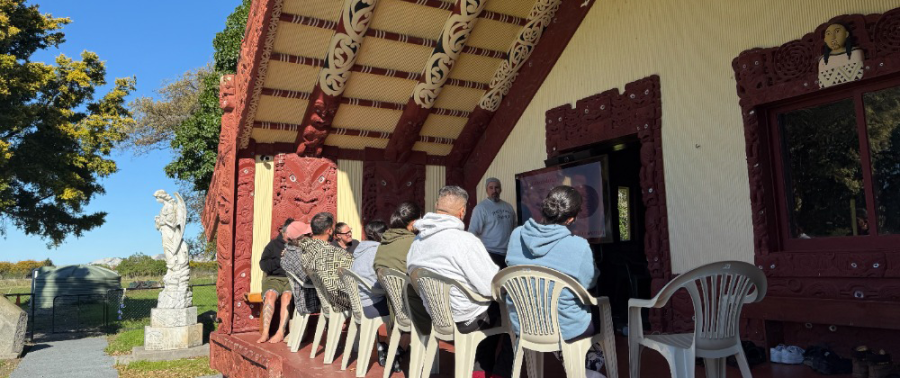
The kaupapa Māori-driven solution adopted by the programme team is to take the course to the students, to meet them where they are - in their rohe, at their marae - through wānanga delivery. The first two courses are delivered via six weekend wānanga held on marae. Wānanga is a culturally appropriate learning model and Māori pedagogical tool based on the concept of whanaungatanga and devoting extended periods of time to engage – kanohi ki te kanohi – in the process of sharing, reflecting, learning and understanding. The programme’s goal is to keep ākonga connected and on their whenua to ensure they can continue to work, support their communities, and have an impact whilst learning. This also enables students to build relationships and collaborate with their peers on their collective goals.
To ensure that students have practical experience in their communities and are well-placed to lead, the programme is structured around a practical project that the student designs and implements. The kaupapa is typically a passion project or aligned with work they are already doing for their organisation or community, but all projects revolve around developing mana motuhake in a cultural context.
They span diverse disciplines and industries in both public and private sectors. To enter the qualification each student submits a portfolio of experience which includes an outline of their proposed project. These projects are developed during the first two wānanga-based courses and delivered over the summer after students participate in a national or international tour designed to expose them to other relevant indigenous initiatives. After delivering their project, students theorise and research an aspect of it.

Early in the programme, it was found that students’ study options could be limited by their academic background, with some lacking an undergraduate degree. To solve this, such students were allowed to enter the first two courses under a 60-point Postgraduate Certificate in Māori and Indigenous Leadership. Completing the certificate with a B-average allowed students to enter the full master’s degree programme. Similarly, many students didn’t enter the programme with the academic skills required to complete their research essay effectively. To scaffold their learning, the elective Kaupapa Māori Research Methods paper was made compulsory, and now provides additional support to aid the transition from group work to the more individualised work of writing the research essay. The programme’s subject librarian attends wānanga to build relationships with students and help develop research skills and, since 2022, small groups of UC staff have travelled to local marae for three weekend writing retreats each year. To ensure that students can benefit from other indigenous perspectives, a compulsory international tour paper exposes them to these frames of reference through haerenga. Since 2017, students have visited locations in New Mexico, Alaska, British Colombia, Saskatchewan, Washington State, Hawaii, and Australia.
The MMIL has always taken a team approach to learning. This involves contracting pou external to the university - eminent Māori leaders who act as mentors for each cohort. These pou have extensive leadership credentials in Māori society and not only bring their mana to the programme, but are also real-life exemplars of leadership who provide both grounded experience and an inspirational mandate for the students to emulate. Some examples are; Dr Bentham Ohia, CEO of Te Wānanga o Aotearoa 1999-2005, Che Wilson, a member of the Tekau-mā-rua who advise and represent the Māori Queen, and Professor Rangi Mataamua (Massey University) who was New Zealander of the Year in 2024. The programme also provides opportunities for its own teaching staff. It has recruited a number of esteemed tohunga from across the motu which has led to the upskilling of staff, giving them the opportunity to facilitate alongside some of the most respected minds in te ao Māori. The successful delivery of this comprehensive programme is an achievement that reflects the contributions of all UC staff, guest speakers, and contracted pou involved.
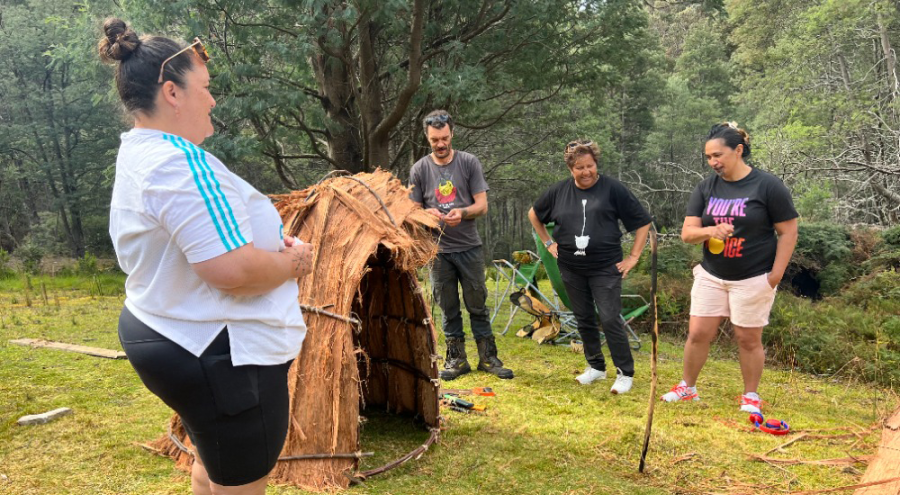
Key benefits of the MMIL are networking, new horizons, dissemination of research, and doctoral study. In 2021, it ran a symposium at UC showcasing the exciting initiatives alumni were implementing and sought funding to hold a further symposium this year. In order to make student research accessible to a wider Māori and indigenous audience, an open access online journal Te Tira, was started in 2023. Each year five of the best tuhinga are selected, edited and published. Many alumni progress on to doctoral study, either at UC or other institutions.
More than 10 alumni have enrolled in a PhD in Māori and Indigenous Studies or other disciplines at UC, from Social Work to Engineering to Education. At least 15 more have enrolled with other tertiary institutions around the motu.
“Our role as educators is not to make this change ourselves, but to empower others to advance mana motuhake and tino rangatiratanga in their own communities – to give our ākonga the mātauranga, academic skills, confidence, and networks to lead without compromising who they are.”
